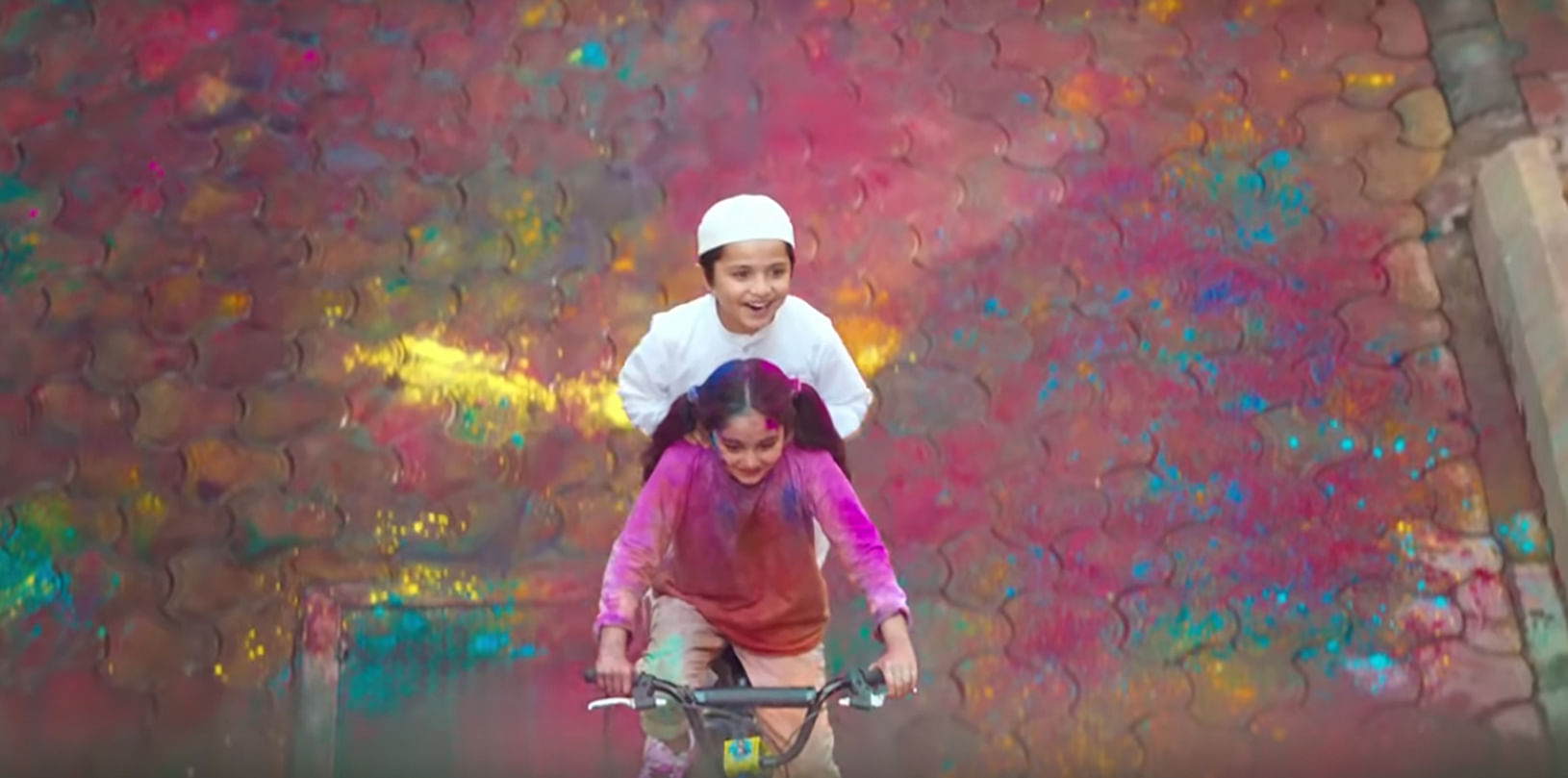
Surf Excel’s latest advertisement featuring a Hindu girl and a Muslim boy celebrating Holi has sparked a campaign by those who see in it an encouragement to ‘Love jihad’.
The one-minute commercial, titled ‘Rang Laaye Sang’ (colours bring people together) ends with the tagline, ‘Agar kuch achha karne mein daag lag jaaye toh daag achhe hai’ (it’s okay if you get stains all over you when you’re doing something good).
Those outraged see it as an insidious scheme in which Muslim boys make Hindu girls fall in love with them so that they can convert them to their religion.
A question has also been raised on the ad for calling Holi colours (sacred colours) ‘daag’ (stain).
Bengaluru-based advertising professionals see the ad from a variety of perspectives, some suggesting it is innocent, and others saying the controversy is prompted by data analysis.
Siddhant More, founder of Mad Over Marketing, says, “At the end of the day, it is just a friend who is trying to help out another.”
It promotes communal harmony. The girl, in the end, calls out to the boy that he will be pulled out to play Holi once he has offered his prayers, he explains.
“If an ad like this had come out 10 years ago, not many would have spoken about it. But digital media has made everyone voice out their opinion even if they don’t make sense,” he says.
Sujit Pavithran, Bengaluru-based branding and marketing communications consultant, recalls an old advertising adage: ‘Controversy sells.’
However, he feels advertisers and clients should use discretion at a time “when everyone gets offended about everything.”
“I always judge ads by the AIDA principle--attention, interest, desire, action. This advertisement stops at grabbing attention. All the rest of the parameters fail,” he says. “This ad hurts the client’s interests big time.”
They gambled with eyes open
Aashiq Kabeer, strategist and business analyst, believes Hindustan Unilever, manufacturers of Surf Excel, took an informed, calculated risk.
“Large companies like HUL aren’t in the business of taking unwarranted risks. Companies of this magnitude do incredible amounts of research to assess the risk/benefit ratio before releasing an advertisement as volatile as this,” he says.
Data analysts probably predicted the outrage and the company would have realised the majority of its target market would receive the ad positively, he surmises.
“The people organising a boycott against the product are negligible in terms of overall sales revenue,” he says.
Executives in the corporate office definitely wouldn’t lose sleep over a few outraged people threatening to boycott Surf Excel. In fact, they are probably waiting to see the increase in sales, he says.
Are they kids or Abhinandan?
Akash Banerjee, political satirist and host of ‘ #TheDeshBhakt’ on Youtube, says data analytics shows the ‘controversy’ was manufactured by some handles in a concerted manner.
“The ad did have controversial bits. For instance, how on earth did that little boy ride on the bicycle when it clearly didn’t have a rear carrier? How did the boys throw balloons with such pinpoint accuracy? Are they kids or Wing Commander Abhinandan? And lastly, there is the element of so much water being wasted and streets being dirtied. These go against the grain of #SaveWater and #SwachhBharatAbhiyan. There should be outrage over these issues,” he says.
Chethan Hiremath, founder and partner at a digital media startup, Okay Done Media, says he would work on ads like these again and again if given a chance.
“I think the ones who have stood against this ad are the ones who don’t know the difference between Surf Excel and MS Excel,” he says.
Muralidharan PC, chief creative officer at ad agency Nicheminds, feels such an ad is risky in sensitive times.
Ramjan Darga, Kannada writer and Basava scholar, feels the country is wasting its time discussing unimportant issues. “I have grown up playing with colours. People from both communities have to safeguard our pluralistic culture by working together,” he says.
It’s all about being friends
Anwar Manippady, BJP leader, feels the ad highlights friendship more than anything else. “It is obvious that the boy can’t go to a mosque with colours on him. The ad just highlights the friendship between the two children and nothing else,” he says.
From an advertising background himself, Manippady says the ad also holds up gender equality by showing an empowered girl.
Ads that didn't shy away
Gillette on macho men
Gillette recently came up with an ad suggesting that men could do better than stick to macho expectations. It illustrated ‘toxic masculinity’ and campaigned against bullying, sexual harassment, and catcalling.
Google reunion
Released in 2013, the Google Search: Reunion ad from Google India had struck an emotional chord within many. The ad was the fictional reunion between two elderly men, one from India and another from Pakistan, separated as children during the Partition.
Fevikwik on cross-border cricket
The Fevikwik ‘ Todo Nahi Jodo’, TV ad, back in 2015, aimed to reduce the negativity surrounding the much-hyped India vs Pakistan match at the ICC Cricket World Cup.
MS or Surf?
The outrage has now moved from social media to Google Play Store.
Microsoft Excel became an unlikely victim of the protesters’ wrath. Uninformed folks confused Surf Excel with Microsoft Excel and gave it a poor one-star rating.
‘Idea noble, treatment wrong’
An office-bearer from the Iskon temple in Bengaluru is not happy about how the ad has turned out.
Although the video seems to project harmony between Hindus and Muslims, it only portrays a sharp cultural divide between the two faiths, he told Metrolife.
He also questioned the choice of a Muslim child for the ad: “Not only Muslims but even Hindus who don’t relate to this festival may not like to get their clothes unclean. Why project only a Muslim boy?”